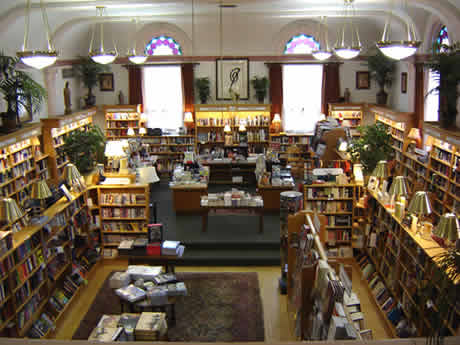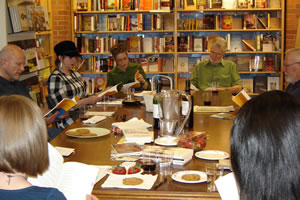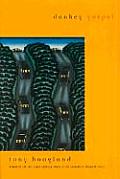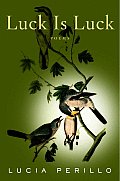Tell us about Boulder Book Store.
Boulder Book Store is Boulder's largest independent bookstore with 20,000 sq. feet, more than 100,000 titles, and three floors. We host more than 200 events in the store and in the community every year. Boulder Book Store has been named "Best of Boulder" by local papers every year since 1987. 
How popular is poetry in general at Boulder Book Store?
Poetry is definitely a good section at our store.
We currently have five cases of poetry and they have strong sales. Within the
store, we always do a big push for National Poetry Month with displays, blog posts,
and more, and we also promote poetry with a number of staff recommendations. Our
head buyer is an avid poetry reader, as are many of the booksellers (some of whom
join us from time to time at the bookclub).
How did The Living Poets Society Poetry Book Club get started?
We've been together for about two and a half years, since November 2007. I started the group shortly after I moved to Boulder and began working at the store. The town where I had lived in Minnesota had a very strong poetry community and I was anxious to recreate that. I also felt the Boulder was a unique place where a poetry bookclub could really thrive.
Where does the name come from?
In my first poetry class in college, our professor challenged us to name two living poets, and very few people (myself included) could. So, when starting the group, I knew I wanted to stay away from the "dead poets" that most people read in high school and college, and to tap into the incredible wealth of modern poetry.
Tell us about your members.
 There are about 14 regulars in the group, with anywhere from 8-12 attending each month. What is unique about the make-up of the poetry bookclub is how diverse it is in comparison with most other bookclubs. Typically, bookclubs are comprised mainly of women, ages 35-55. The Poetry bookclub, however, has as many men as women, and the ages span from 20 to 70. We have an attorney, a psychiatrist, an artist and an English professor. It really is a diverse and unique group.
There are about 14 regulars in the group, with anywhere from 8-12 attending each month. What is unique about the make-up of the poetry bookclub is how diverse it is in comparison with most other bookclubs. Typically, bookclubs are comprised mainly of women, ages 35-55. The Poetry bookclub, however, has as many men as women, and the ages span from 20 to 70. We have an attorney, a psychiatrist, an artist and an English professor. It really is a diverse and unique group.
I sometimes feel bad for newcomers, because we all know each other well enough and are laid back enough that we tend to just talk on top of each other and you sometimes have to just butt in to get a say. That said, everyone is really respectful, such that we can all completely disagree and yet it only adds to the quality of the discussion.
Are most new to poetry when they join, or already avid poetry readers and writers?
A handful of the group (maybe half) also write poetry themselves, many of them are published and very involved in the poetry community. Others are simply appreciators of poetry. Most of the people come to the group having read and enjoyed some poetry on their own, though everyone's background is unique. Some have only read the dead poets, some read only the poetry books for the group, and others are constantly exploring new poets and bringing their insights to the meetings.
Has it been difficult to get people to join a poetry book group?
Not at all! In fact, we've had to cut back on how much we advertise the group, for fear of it getting too large! Bookclubs tend to reach capacity at around 12 members - beyond that it becomes hard for everyone to talk. We have had a great amount of interest in the group from the beginning, and though we occasionally lose members to moves and scheduling, we're also always adding new members to the mix.
Do you gravitate towards a certain kind of poetry or away from other kinds?
We've discovered that we tend toward more narrative poetry, usually with strong imagery and metaphors. We make attempts to broaden our horizons with more experimental poetry and whatnot, but we still veer back to what we like.
How do you think reading poetry in a group encourages deeper understanding or engagement with the text? Do you think it makes it more accessible to those who feel that poetry is difficult to understand?
Poetry is such a complex entity, and works on so many levels, that it often happens that the more times you read a poem, the more you take from it. I know that for me, there have been many times where I've gone to the group not understanding or liking many of the poems, but after hearing other people discuss or point out what they took from them, I always leave with a much deeper appreciation & understanding (even if I still don't necessarily like the poems!). The discussion helps to bring out the many layers of a poem that might not be evident on a first read.
Why do you think people are so reluctant to read poetry?
I think a lot of people associate "poetry" only with what they've read in high school and college (usually the dead poets). That kind of poetry has dated diction that is difficult to access, and is much more formal structurally, which also makes it a challenge to get into. Because of the analytical discussions or lectures that it typically takes for people to access these kinds of poems, they then assume that all poetry is this difficult. But modern poetry can be read and understood as easily as a novel! The verse is freer, the subject matter is current and relevant, and the language is everyday.
Why do you think it's important to change those attitudes?
I think it's important to change this because there is such a wealth of modern poets, and also because in such a fast-paced world, poetry is a medium that forces you to slow down, to consider the details, and to appreciate something as simple as an image or the way words play with one another.
What encouragement would you offer readers who are daunted or turned off by poetry?
I would encourage daunted readers to leave behind their preconceptions about poetry, especially those about it being work rather than enjoyment, and about it being very intellectual. Most of my favorite poets are accessible and irreverent. Reading a poem can be every bit as enjoyable as reading a novel.
What advice would you offer for book clubs interested in adding a poetry title to their list?
Well, first I would say: Woohoo! For newcomers to poetry, it's usually best to pick books that contain some of the narrative structure of novels, so choose a book of narrative poetry, or a book of interconnected poems. James Tate's later poetry books are like mini-short stories. Other narrative and accessible poets include Billy Collins, Mary Oliver, Tony Hoagland, Sharon Olds, and Ted Kooser. A good way to pick a book is simply to browse the poetry section of your local bookstore, grab a book, flip to a random poem and give it a read. It will give you an idea of the accessibility and style of the poet.
Once you're started, a great way to get readers engaged is to have them read their favorite poem from the book out loud. This adds a great element to the meetings, and is totally doable since most poems are only a page long. Plus, it gives the group the chance to re-consider the poem and find new things than they did on their first reading.
As far as leading the discussion, I usually try to have a few reviews and talking points handy (such as: What did you think about the poet's attention/lack of attention to form and rhyme? What did you think about the poet's line breaks and whether they added anything to the poem? What did you think about the title of the book and how it added to the overall themes? What did you think about the poet's constant use of rhetorical questions?), but typically getting people to talk about specific poems is enough to keep things rolling.
How do you usually get the discussion started in your group?
I always bring some biographical information about the poet, as well as some positive and negative reviews. Hearing those reviews usually gives someone something to jump off from (agree/disagree with), and if that doesn't work, then we usually go around and share a poem that we particularly like (we try to read a good number out loud), and that gets things going. If we all agree (love/hate) generally, I'll try to play devil's advocate, because it makes the discussion more interesting.
Tell us about some of the books that have generated the most interesting discussions? Are there any that haven't worked?
Some of the most interesting discussions we've had have been when we've hosted the author of the book at the meeting. We've read a few different books by local authors, then invited the author to join our discussion. The author has always been more than happy to do so. We'll meet to chat about the book by ourselves for a bit, then have the author join us partway through. It's a great experience and very insightful.
The more experimental or avant-garde books are definitely the ones that haven't worked as well. Also, oddly, some of the ones that we all love made for the least interesting discussions, since disagreement fuels a discussion more than just gushing about how much we love a book. I'm hesitant to names names of the ones that bombed, lest karma come round to me...
Any favorites?

 Luck
Is Luck, by Lucia Perillo; Notes
for My Body Double, by Paul Guest; Donkey
Gospel, by Tony Hoagland; For
Love of Common Words, by Steve Scafidi; and Sleeping
Preacher, by Julia Kasdorf.
Luck
Is Luck, by Lucia Perillo; Notes
for My Body Double, by Paul Guest; Donkey
Gospel, by Tony Hoagland; For
Love of Common Words, by Steve Scafidi; and Sleeping
Preacher, by Julia Kasdorf.
Thanks for talking with us, Stephanie! I know our readers will be inspired and encouraged by your love of poetry, and we look forward to hearing from them about their poetic adventures.




Tread softly because you tread on my dreams.
Click Here to find out who said this, as well as discovering other famous literary quotes!
Your guide toexceptional books
BookBrowse seeks out and recommends the best in contemporary fiction and nonfiction—books that not only engage and entertain but also deepen our understanding of ourselves and the world around us.